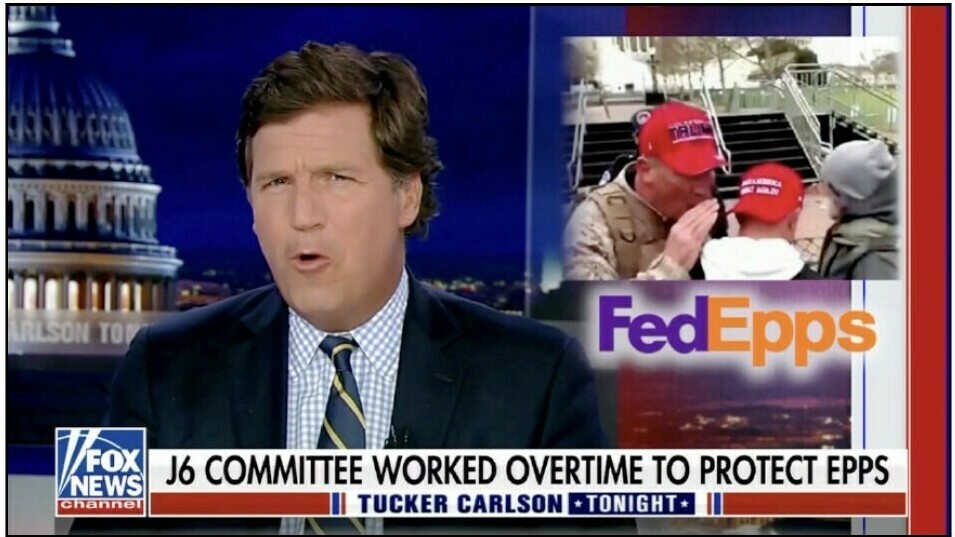Ray Epps V. Fox News: A Defamation Case Examining January 6th Misinformation

Table of Contents
The Allegations Against Fox News
Ray Epps, a former U.S. Army sergeant, alleges that Fox News knowingly spread false and defamatory statements about his involvement in the January 6th Capitol riot. The core of his claim centers on the assertion that he was a federal agent or instigator of the violence, a narrative repeatedly pushed by several Fox News personalities. These allegations painted Epps as a key figure orchestrating the events, leading to significant personal consequences.
- Specific instances of alleged misinformation: Fox News hosts and guests repeatedly linked Epps to an alleged FBI plot to incite the riot. This included showcasing edited videos and selectively highlighting his presence at events preceding the attack, omitting crucial context.
- Impact on Epps' life: The false narratives resulted in a barrage of death threats, harassment, and online abuse directed at Epps and his family. He was forced to leave his home and endured significant emotional distress due to the false accusations. This highlights the very real human cost of misinformation campaigns.
- Keywords: Ray Epps defamation, Fox News lawsuit, January 6th misinformation, Capitol riot, false narratives, media accountability, death threats, harassment, online abuse.
Key Arguments in the Epps v. Fox News Case
Epps' legal team argues that Fox News acted with "actual malice," knowingly disseminating false information or recklessly disregarding the truth. This is a crucial element in defamation cases involving public figures, as established in New York Times Co. v. Sullivan (1964). Fox News, conversely, maintains that its reporting was protected under the First Amendment and that any inaccuracies were unintentional or part of legitimate news coverage.
- Legal arguments: Epps’ case relies heavily on presenting evidence demonstrating Fox News' awareness of the falsity of the claims about him. This includes internal communications, emails, and testimonies from Fox News employees.
- Evidence presented: The trial featured a vast array of evidence, including news segments, social media posts, and expert testimony analyzing the spread of misinformation. A critical aspect involves showcasing the discrepancies between the narratives presented on air and the available factual evidence.
- Legal precedents and strategies: The case draws upon established defamation law, particularly concerning the standard of "actual malice" for public figures. Both sides have employed extensive legal strategies to present their case, including expert witnesses specializing in media analysis and defamation law.
- Keywords: actual malice, defamation law, legal arguments, evidence, January 6th trial, court proceedings, New York Times Co. v. Sullivan, First Amendment.
The Broader Implications of the Case
The Epps v. Fox News case has far-reaching implications for the media landscape. A verdict in Epps' favor could set a significant precedent, potentially leading to increased accountability for media outlets disseminating misinformation. This could also encourage more cautious reporting on sensitive political events.
- Media responsibility and accountability: The case forces a crucial conversation about the responsibility of media organizations to ensure accuracy in their reporting, especially concerning sensitive political issues.
- Free speech versus accurate reporting: The case highlights the tension between protecting free speech and holding media responsible for spreading demonstrably false information that causes harm. Striking a balance between these principles is vital.
- Implications for future cases: The outcome will influence future defamation lawsuits involving misinformation and the January 6th events, establishing legal benchmarks for future cases.
- Keywords: media responsibility, misinformation, accountability, free speech, First Amendment, chilling effect, January 6th consequences, media accuracy.
The Role of Social Media in Amplifying Misinformation
Social media played a significant role in amplifying the false narratives about Ray Epps. The rapid dissemination of the claims through various platforms, often without fact-checking, contributed significantly to the widespread belief in the conspiracy theories.
- Social media's role: Algorithms on platforms like Facebook and Twitter often prioritized sensationalized content, leading to the rapid spread of misinformation about Epps. This resulted in a considerable echo chamber effect.
- Combating misinformation online: The case underscores the challenges of effectively moderating content and combating misinformation on social media platforms. It highlights the need for stronger fact-checking mechanisms and improved content moderation strategies.
- Responsibility of social media companies: The case raises questions about the responsibility of social media companies to prevent the spread of demonstrably false and harmful narratives.
- Examples of amplification: Specific examples of social media posts, tweets, and online forums sharing the false claims about Epps can be analyzed to understand how the misinformation spread.
- Keywords: social media, misinformation, disinformation, online platforms, content moderation, algorithm bias, January 6th social media, echo chamber effect.
Conclusion
The Ray Epps v. Fox News defamation case represents a critical examination of media accountability in the age of misinformation. The lawsuit highlights the serious consequences of spreading demonstrably false narratives and the impact on individuals falsely accused. The outcome will significantly influence future cases and shape the media's responsibility in reporting on sensitive political events.
Understanding the implications of the Ray Epps v. Fox News defamation case is vital for all citizens. Stay informed about the legal proceedings and consider the role of media and social media in shaping public discourse. Learn how to identify and combat January 6th misinformation to ensure a more informed and responsible media landscape. Continue to follow updates on this crucial case regarding media accountability and the spread of false narratives.

Featured Posts
-
 The Collapse Of Putins Peace Talks A Diplomatic Assessment
May 18, 2025
The Collapse Of Putins Peace Talks A Diplomatic Assessment
May 18, 2025 -
 Ope Partners Welcomes Snl Alumna Leslie Jones
May 18, 2025
Ope Partners Welcomes Snl Alumna Leslie Jones
May 18, 2025 -
 Uks Eurovision 2025 Entry Controversy And Past Scandals
May 18, 2025
Uks Eurovision 2025 Entry Controversy And Past Scandals
May 18, 2025 -
 Large Scale Reddit Outage Impacts Thousands Of Users
May 18, 2025
Large Scale Reddit Outage Impacts Thousands Of Users
May 18, 2025 -
 Putins Diplomatic Blunder The Failed Attempt At Peace Talks
May 18, 2025
Putins Diplomatic Blunder The Failed Attempt At Peace Talks
May 18, 2025
Latest Posts
-
 Kanye Wests Funeral Instructions Inspired By Pasha Technik
May 18, 2025
Kanye Wests Funeral Instructions Inspired By Pasha Technik
May 18, 2025 -
 Did They Split Kanye West And Bianca Censori Dine Together In Spain
May 18, 2025
Did They Split Kanye West And Bianca Censori Dine Together In Spain
May 18, 2025 -
 Pokhorony Po Uestovski Vdokhnovenie Ot Pashi Tekhnikom
May 18, 2025
Pokhorony Po Uestovski Vdokhnovenie Ot Pashi Tekhnikom
May 18, 2025 -
 Instruktsiya Kane Uesta K Sobstvennym Pokhoronam Vdokhnovenie Ot Pashi Tekhnikom
May 18, 2025
Instruktsiya Kane Uesta K Sobstvennym Pokhoronam Vdokhnovenie Ot Pashi Tekhnikom
May 18, 2025 -
 Kanye West Bianca Censori Enjoy Dinner Date In Spain Amidst Relationship Speculation
May 18, 2025
Kanye West Bianca Censori Enjoy Dinner Date In Spain Amidst Relationship Speculation
May 18, 2025
